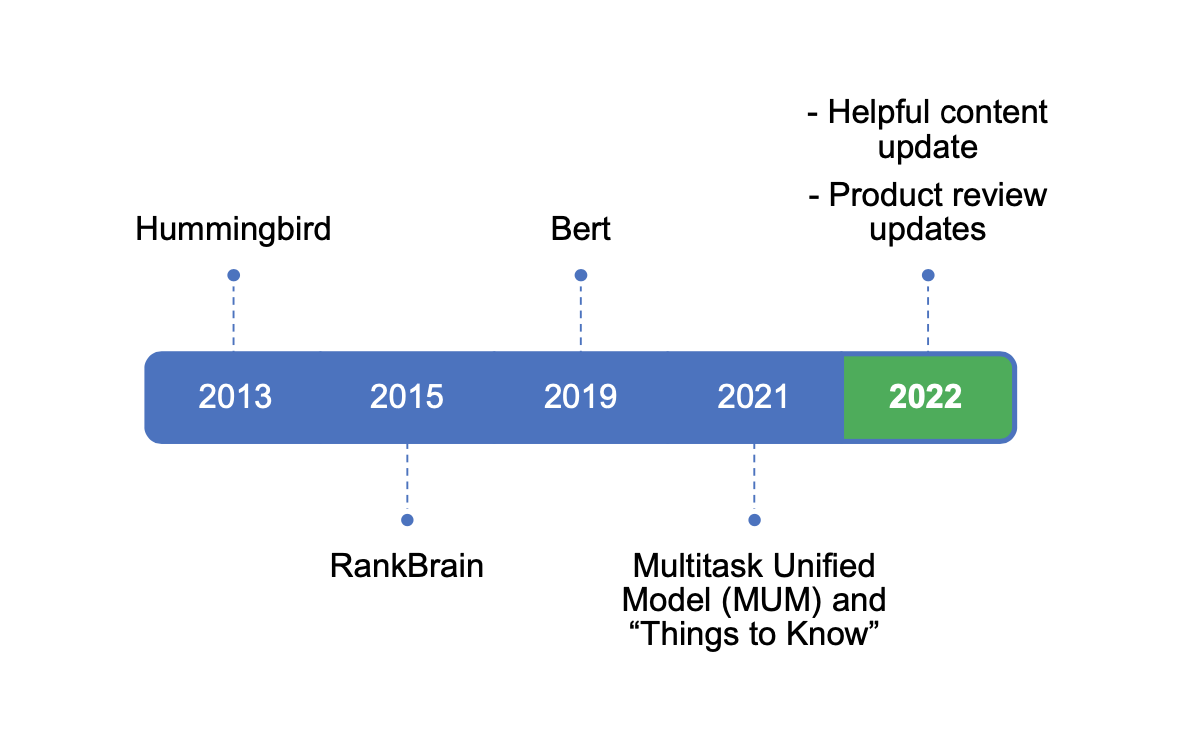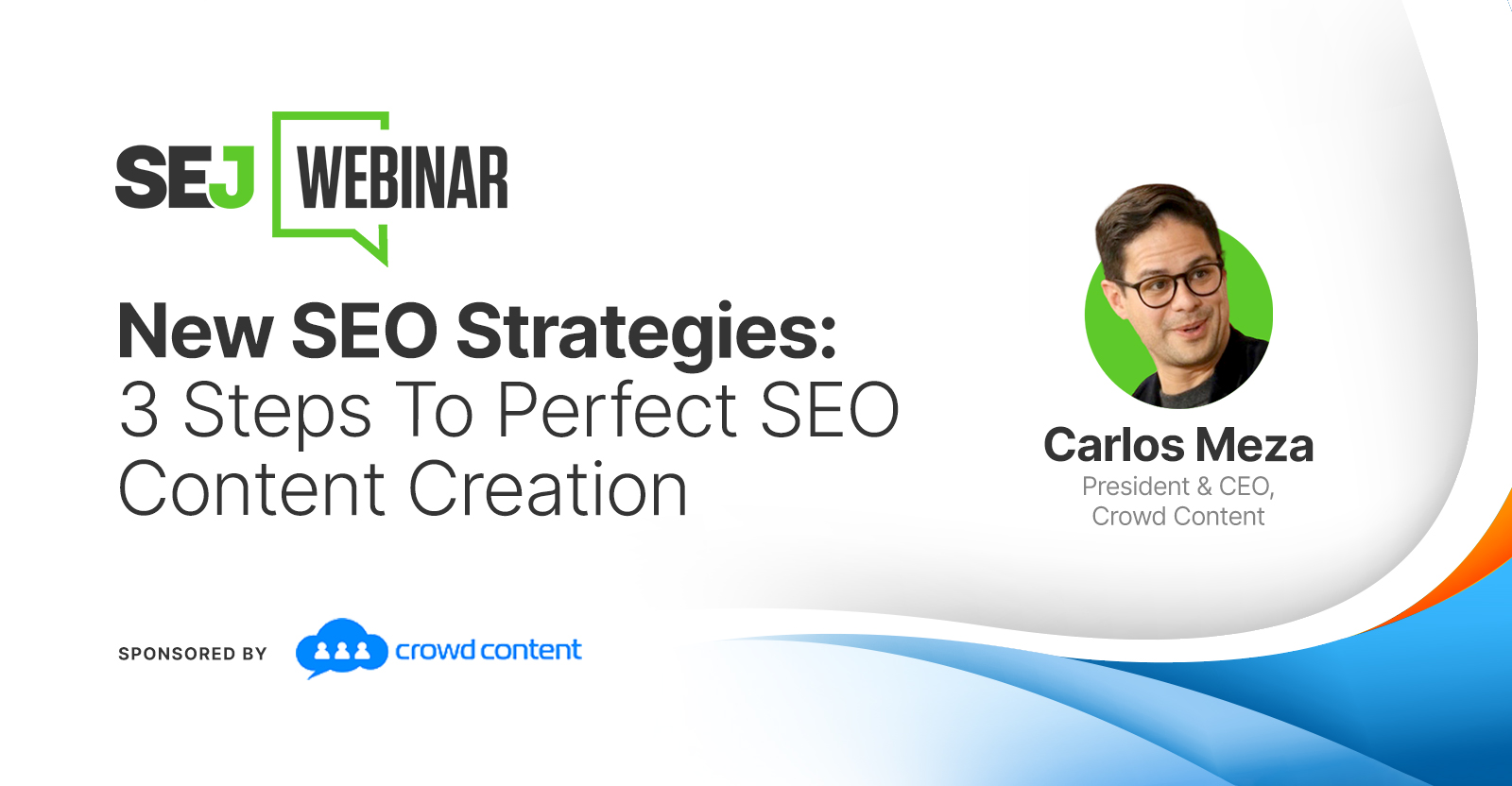Are you forward-thinking in your approach to search marketing?
When was the last time you updated your content strategy?
With Google’s ever-changing algorithm, your SEO tactics must continue to evolve.
Search engines are known to reward websites that publish high-quality content – consistently.
Gone are the days when businesses could rank on Google simply by pumping out generic, keyword-stuffed material.
Now, the key to higher rankings is creating content that offers maximum value to searchers.
On October 6, I moderated a webinar with Carlos Meza, President & CEO at Crowd Content.
Meza explained how to optimize your content for user intent and relevancy by using a meaningful content structure.
Here is a summary of the webinar. To access the entire presentation, complete the form.
Key Takeaways
- Use human-first content. Focus on the user and how you can help them. Ensure that your content leaves them with takeaways.
- Topic Clusters answer not only one question but all the questions that the searcher might have.
- Tap into Subject Matter Experts (SMEs) to increase your Expertise, Authoritativeness, and Trustworthiness (E-A-T) score, gain a competitive advantage, and upgrade your content.
Content Creation: What’s Changed Over The Years
2022 has been focusing on quality content, with 6 out of 7 updates targeted toward content.
 Crowd Content, Oct 2022
Crowd Content, Oct 2022Today, some content methods are no longer applicable.
Search Engines are getting better at understanding content as humans would; it now:
- Puts context into queries and sentences.
- Punishes keyword stuffing.
- Analyzes the holistic meaning of a query.
- Looks at the meaning/scope of whole paragraphs.
- Leverages NLP and AI to predict information people want.
[What’s NLP?] Instantly access the webinar →
In light of these updates, what do you need to do?
What To Do Now: Write For Humans
Unfortunately, over time, we became too technical in SEO and forgot that the content we produce is supposed to serve a purpose for humans.
Writing for humans means producing high-quality content. Here’s how.
High-Quality Content: 3 Factors To Consider
When you want to start writing high-quality content, there are three factors to look at.
Factor #1: Empathetic, People-First Content
Ask yourself, what would you feel if you were in the shoes of the reader?
Humans respond to narratives, stories, brands, and information – and so do search-engine algorithms!
So, make sure you:
- Start with intent – the “why.”
- Focus on the “who.”
- Personalize content.
- Tell stories.
- Make it readable & user-friendly.
[Check out Google’s guidance] Instantly access the webinar →
By writing people-first content, you’ll stay aligned with Google’s narrative that great content is the best way to protect yourself from updates.
Factor #2: Topic Clustering
Topic clusters are resources that answer all the questions around a topic.
When you think about topic clustering, you can think about it like what you’ll have on your plate for dinner.
[Learn what we mean] Instantly access the webinar →
Focus On Topics & Not Keywords
Now, this doesn’t mean keywords don’t work anymore. It just means keywords should be within the topic cluster.
Topic clusters are great for:
- Future-proofing SEO.
- Scaling SEO strategy based on topics.
- Internal linking.
- Attracting backlinks.
- Increasing web engagement.
- Increasing conversion.
[Find out where to start with clusters] Instantly access the webinar →
Factor #3: Subject Matter Experts (SMEs)
A subject matter expert has highly specialized knowledge of a particular industry or field.
Having an SME onboard your content has advantages; they can:
- Improve E-A-T score (must-have for YMYL content).
- Give you a competitive advantage.
- Build trust.
- Make content unique.
- Provide more organic opportunities for backlinks.
[Discover the recipe to producing great E-A-T content with an SME] Instantly access the webinar →
A Note On Artificial Intelligence (AI)
Is AI good or bad for content? It depends on how you use it.
For example, AI is a tool to help writers be more productive, overcome writer’s block, and create an outline.
However, AI will not replace 100% of what a writer can do.
So, it’s best to proceed cautiously when using AI to create content.
Make sure your content strategies stay up-to-date by applying all the principles discussed in the on-demand webinar.
You’ll find that adapting to the rapidly changing SEO standards will be easier, and you’ll be able to energize more of your online presence.
New SEO Strategies: 3 Steps To Perfect SEO Content Creation [Webinar]
Here’s the presentation:
Join Us For Our Next Webinar!
Beyond ROAS: Aligning Google Ads With Your True Business Objectives
Join Justin Covington, Director of Paid Channels Solutions at iQuanti, as he breaks down the Google Ads changes and show you how to use value-based bidding to drive measurable results.
Image Credits:
Featured Image: Paulo Bobita/Search Engine Journal


